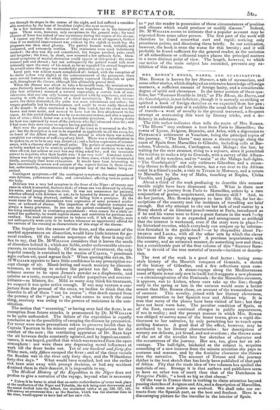MRS. ROMER'S RIIONE, DARRO, AND GUADALQUIVIR. Mas. ROMER is known
for her &Termer, a tale of mesmerism, and some other stories, which displayed an extensive knowledge of foreign. manners, a sufficient amount of foreign laxity, and a considerable degree of spirit and cleverness. In the latter portion of these qua- lities, her " Summer Ramble in 1842," or The Rhone, the Darro, and the Guadalquivir, is not deficient ; though it is scarcely so striking or spirited a book of foreign sketches as we expected from her pen ; and a considerable part of it exhibits the usual faults of late books of travels—a want of novelty in the ground traversed, a frequent attempt at overcoming this want by literary tricks, and a de- ficiency in substance.
The title rather indicates than tells the route of Mrs. Roams. " The Rhone " may embrace a tour from Paris to Marseilles; the towns of Lyons, Avignon, Beucaire, and Arles, with a digression to PETRARCIeS retirement at Vaucluse, being the principal topics of the journey. "The Darro" may mean a steam-voyage along the coast of Spain from Marseilles to Gibraltr, including calls at Bar- celona, Valencia, Alicant, Carthagena, and Malaga ; the last, by Waiting for the next steamer, rising to a sojourn, since it permitted the tourists to make a trip to Granada, with a survey of the Alham- bra and all its wonders, and to " assist " at the Malaga bull-fights- " The Guadalquivir" not only embraces Gibraltar, and a steam- trip thence to Seville and the return, but a run over to the African- coast in a friend's yacht, a visit to Tetuan in Morocco, and a return- to Marseilles by the way of Malta, touching at Naples, Civita Vecchia, and Leghorn.
About a third of the work professing to describe this summer ramble might have been dispensed with. What is there new to be told of a journey from Paris to Marseilles, unless by a rare conjunction of genius, acquirement, and literary skill ? And, to do her justice, Mrs. ROMER appears to have felt this, for her de- scriptions of the country and the incidents of travelling are brief , enough. But why attempt to eke out her lack of real matter by a flimsy sketch of an itinerant pencil-vender at Paris, introduced as if he and his wares were to form a great feature in the work ?—by a tale where matter is so expanded and arrangement so artificial that the interest is weakened, even if the story were in place ?- by historical reveries, which everybody can conjure up by informa- tion furnished in the guide-book ?—or by rhapsodies about PE-, TRARCH and LAURA, with all the other arts by which the clever litterateur fills up empty space ? A previous acquaintance with the country, and an animated manner, do something now and then ; but a considerable part of the first volume of this " Summer Ram- ble " is devoid of the true material of travels—incident or descrip- tion.
The rest of the work is a good deal better ; bating some stale history of the Moorish conquest of Granada, a sketch of the history of Gibraltar, and a few reflections upon com- monplace subjects. A steam-voyage along the Mediterranean coast of Spain is not only new in itself, but it suggests a new pleasure —a circumnagivation of the Peninsula : for the Marseilles steamers, it appears, run to Lisbon, where ours take up the line ; though early in the spring or late in the autumn would seem a better- season than Mrs. ROMER chose, on account of the tremendous heat of summer. This novelty, joined with her literary cleverness,. impart attraction to her Spanish tour and African trip. It is true that many of the places have been visited of late; but they have not been worn bare. The peculiar condition of Spain, as of the East, causes continual changes in public appearances, if not in reality ; and the prompt manner in which Mrs. ROMER was obliged to survey some of the lesser towns, gives a rapid dis- tinctness to her narrative, by only permitting her to touch upon striking features. A good deal of the effect, however, may be attributed to her literary characteristics : her descriptions of scenery are delicate, yet broad, and not overdone ; she throws some of the art of the novelist into her sketches of character and the occurrences of the journey. Her sex, too, gives her an ad- vantage. The bull-tight, hacknied as the subject is, acquires something of a new interest from the minute attention she pays to costume and manner, and by the feminine character she throws into the narrative. The account of Tetuan and the journey thither is the best sketch that has lately been published of that part of Africa. Pity that the trade idea of two volumes has spoiled the materials of one. Strange it is that authors and publishers seem• to have no other test of merit than that of the Dutchman in Peregrine Pickle, " a book as big as that cheese."
Of the tour in France there is nothing to claim attention beyond. passing sketches of Avignon and Aix, and a description of Marseilles, in which some new points are evolved. We shall take our ex- tracts from the Spanish part, as the best and freshest. Here is a discouraging picture for the traveller in the interior of Spain.


























 Previous page
Previous page